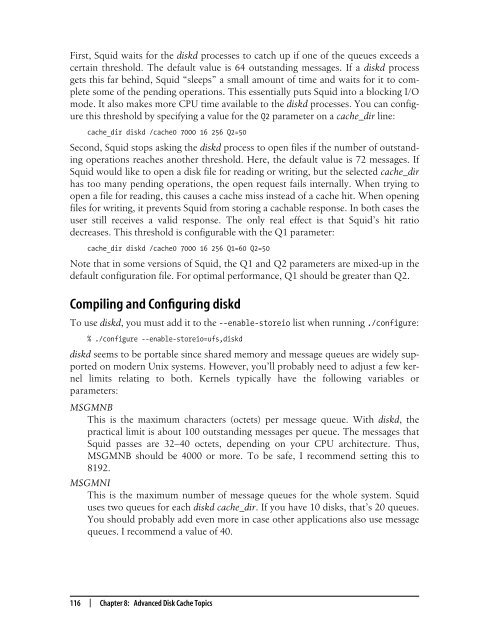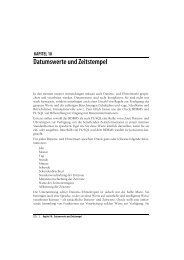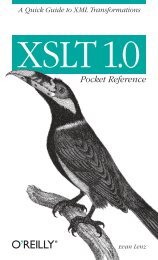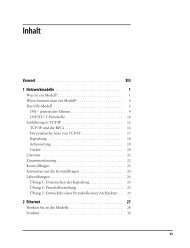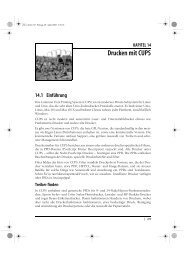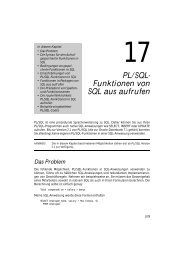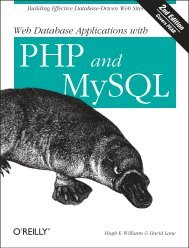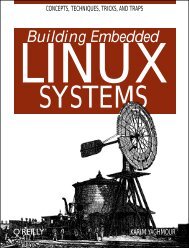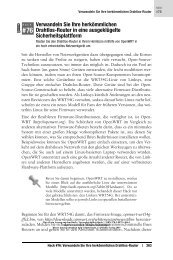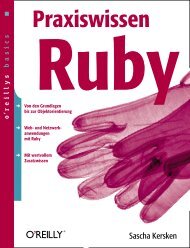Advanced Disk Cache Topics
Advanced Disk Cache Topics
Advanced Disk Cache Topics
Create successful ePaper yourself
Turn your PDF publications into a flip-book with our unique Google optimized e-Paper software.
First, Squid waits for the diskd processes to catch up if one of the queues exceeds a<br />
certain threshold. The default value is 64 outstanding messages. If a diskd process<br />
gets this far behind, Squid “sleeps” a small amount of time and waits for it to complete<br />
some of the pending operations. This essentially puts Squid into a blocking I/O<br />
mode. It also makes more CPU time available to the diskd processes. You can configure<br />
this threshold by specifying a value for the Q2 parameter on a cache_dir line:<br />
cache_dir diskd /cache0 7000 16 256 Q2=50<br />
Second, Squid stops asking the diskd process to open files if the number of outstanding<br />
operations reaches another threshold. Here, the default value is 72 messages. If<br />
Squid would like to open a disk file for reading or writing, but the selected cache_dir<br />
has too many pending operations, the open request fails internally. When trying to<br />
open a file for reading, this causes a cache miss instead of a cache hit. When opening<br />
files for writing, it prevents Squid from storing a cachable response. In both cases the<br />
user still receives a valid response. The only real effect is that Squid’s hit ratio<br />
decreases. This threshold is configurable with the Q1 parameter:<br />
cache_dir diskd /cache0 7000 16 256 Q1=60 Q2=50<br />
Note that in some versions of Squid, the Q1 and Q2 parameters are mixed-up in the<br />
default configuration file. For optimal performance, Q1 should be greater than Q2.<br />
Compiling and Configuring diskd<br />
To use diskd, you must add it to the --enable-storeio list when running ./configure:<br />
% ./configure --enable-storeio=ufs,diskd<br />
diskd seems to be portable since shared memory and message queues are widely supported<br />
on modern Unix systems. However, you’ll probably need to adjust a few kernel<br />
limits relating to both. Kernels typically have the following variables or<br />
parameters:<br />
MSGMNB<br />
This is the maximum characters (octets) per message queue. With diskd, the<br />
practical limit is about 100 outstanding messages per queue. The messages that<br />
Squid passes are 32–40 octets, depending on your CPU architecture. Thus,<br />
MSGMNB should be 4000 or more. To be safe, I recommend setting this to<br />
8192.<br />
MSGMNI<br />
This is the maximum number of message queues for the whole system. Squid<br />
uses two queues for each diskd cache_dir. If you have 10 disks, that’s 20 queues.<br />
You should probably add even more in case other applications also use message<br />
queues. I recommend a value of 40.<br />
116 | Chapter 8: <strong>Advanced</strong> <strong>Disk</strong> <strong>Cache</strong> <strong>Topics</strong><br />
This is the Title of the Book, eMatter Edition<br />
Copyright © 2004 O’Reilly & Associates, Inc. All rights reserved.


